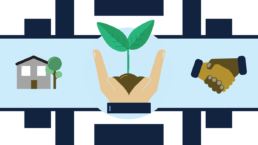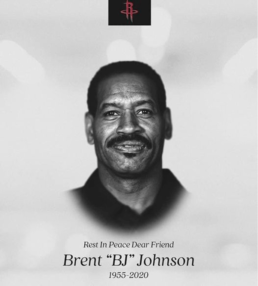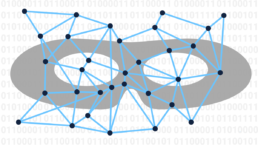2020: Cloudy with a Chance of Thundersnow… and a Twinkle of Hope
Until you’ve experienced it, you might not believe that thundersnow exists. When you put these two words together, they sound like a make-believe fairy tale nightmare or a phony phrase created for children’s books.
News flash: Thundersnow is real. And it’s perhaps a cruel metaphor for 2020.
Is it thundersnow, or is it COVID?
During a thundersnow storm, snowfall intensity severely limits visibility, winds atof or above tropical storm force are frequent, frostbite is nearly instant if you’re exposed to the elements, and the positive polarity is associated with greater destructive potential than lightning. So… not only is it something you’d never expect to happen, but you have to stay inside to stay safe. It’s kinda like living through COVID.
If there’s one takeaway from a year that seemed so promising when the ball dropped in Times Square on December 31st, ringing in a decade that we only dreamed about in sci-fi novels — it’s that we are resilient. We harnessed the concept of change agility, learned to be nimble in our (personal and business) goals and actions, and remembered to acknowledge gratitude and hope in a more authentic way than ever before.
Our wish for you
If you’ve experienced personal loss, job loss, illness, or hardship of any kind this year, we’re holding you in our hearts. We wish nothing but strength, healing, and abundance for you in the New Year.
What’s 2021 look like?
Right now, we’re faced with a future that seems to be filled with more questions than answers. We ask ourselves questions like, “Can business really be a force for good?” and “Is it possible to focus on mission-based work and still make a profit?” Challenging the status quo is healthy — after all, our children’s future depends on the decisions we make right now.
Climate change? It’s real. Social inequality? The gap is widening between the rich and the poor. A massive shift in the way companies do business? It’s happening. Goodbye offices, hello Zoom, and welcome to a new trend of outsourcing and utilizing contract work — companies are bringing in experts on a project basis rather than hiring a more robust full-time staff. This strategic move saves businesses money on benefits, training, and supplies. Additionally, it allows for a more flexible work schedule and focuses on areas that a smaller company may need to utilize on an intermittent — or temporary — basis. With the rise of a “gig economy,” or a free market system of employment, this strategy is also appealing and beneficial for contractors based on short-term and temporary contract work.
There are a lot of things that have gone right this year; let’s not forget that. And as we straddle the line of empathy and ambition, we’re here to be the light at the end of the tunnel of 2020. All of the trends we see as this year comes to an end drive our strategic goals for 2021.
We believe in the twinkle of hope that the New Year brings. Onward!
Lindsay Hope is a copywriter and marketing strategist with CoPeace. As a forward-thinking holding company, CoPeace is building a portfolio of carefully selected for-profit companies with measurable social and environmental impact. To learn more about impact investing, check out CoPeace’s Intro to Impact Investing.
Giving Gifts with Purpose

Happy Holidays!
December is a special month, and we have so many holidays to celebrate in December. We have Hannukah, Christmas, and Kwanzaa. All these festivals believe in peace, joy, and unity all over the world. With all the craziness going on in the world currently, these holidays are awaited so eagerly.
With holidays comes the gift-giving. We need to be mindful of giving gifts to our loved ones. Sometimes, the gifts we give are returned or not liked. A unique and different way of gifting is financial gift-giving, which includes contributing to college costs, giving charities, cash, stock and impact investing.
Gift as Stock
Many parents and grandparents like the idea of ushering their children or grandchildren down the path of financial literacy and financial responsibility. Giving kids a financial gift starts the conversation of how much to spend on something for myself, how much to save toward a major goal, and how much to share with others in need. You can give by purchasing stocks, bonds, mutual funds, or ETFs as a holiday gift to children. It helps if the stocks are in companies, such as Apple, Disney, or Facebook, that they know, understand, and get excited about. Stockpile is one such company which allows you to buy gift cards that recipients can redeem for fractional shares of stock in over 1,000 companies and ETFs.
College Savings
If you have younger children on your list this year, but you still want to give the gift of education, look into opening a 529 plan or contributing to an existing account. These are tax-advantaged accounts specifically designed to help families save for education costs.
Student loan debt
While saving for college can make a great gift, paying off student loan debt is also a worthwhile approach to holiday giving. There is company called Gift of College which has its gift cards available to make the payments for the student loans.
Job skills
Help your friends and family sharpen their skills or expand their knowledge base this holiday season. You never know; it could lead to a promotion or a better paying job in the new year. Online learning websites like Udemy, Coursera, and LinkedIn Learning provide gift certificates to offer someone to take courses.
Charity as a gift
The season of giving is upon us, and this year especially, the need is great. Consider giving a donation or making a charity as a gift this year — it’s a great way to give back to others. It also demonstrates how well we know our loved ones by supporting the causes they care about. In addition to charitable giving being a rewarding experience, it comes with tax benefits.
Impact Investing
If you’re currently assessing your budget and have extra dollars you’d like to spend this year investing in your family’s future…Or if you’re looking for a fresh, new idea for how to spend your EOY budget allocation for investments…
Right now *might* just be the perfect opportunity for you to invest in CoPeace before the end of the year. Investing now is an opportunity to use your dollars for good — by supporting causes you care about and earning financial returns.
I believe, there are so many ways to make gift-giving in a real sense meaningful and purposeful.
Aarti Karnik is the Director of Web Development with CoPeace. As a forward-thinking holding company, CoPeace is building a portfolio of carefully selected for-profit companies with measurable social and environmental impact. To learn more about impact investing, check out CoPeace’s Intro to Impact Investing.
Make a Difference Day
Saturday, Oct. 24, marks the 28th National Make a Difference Day, the largest national day of community service.
Here at CoPeace, it may truly be the reason we exist today. It’s when we individually reached a point in our careers, and focused on a greater cause, and committed to make an impact, that our impact-driven company, CoPeace, was born.
As we sit with our brothers and sisters from around the world in a pandemic these past seven months, we see homelessness, divisiveness, hunger and climate crisis all around us. It’s been the most dire of times for so many of us, I’m not sure if there has ever been a more needed time for community than now.
Making a difference can take many different forms. One can make a difference by checking in on the elderly, or collecting cans for a food pantry, or picking up litter. There are many volunteer opportunities and acts to help mitigate the planet’s bigger issues such as plastic waste, greenhouse gas emissions, and water scarcity.
The local chapters of United Way have done an incredible job within their local communities, mobilizing to different causes.
Even the smallest of efforts can change a community and subsequently the world.
The Aspen Strategy Group is leading an effort to establish a National Service. A non-political program to bring “community” back, front and center, providing jobs and assistance where it’s most needed. A program that could help working parents teach STEM to under-privileged communities and close the opportunity gap.
When I think of the power and intention of this day, I can’t help but think of my recently departed friend Brent Johnson. B.J. was a scout for the Houston Rockets and a pillar in the basketball industry.
B.J. had an infectious smile and made time for everyone around him. He was the ultimate giving person.
His impact was felt by all he touched. To aspiring basketball players, he encouraged them; to community members, he welcomed them and shared; to industry colleagues, he treated them with respect.
He made sure you knew that you were valued by him. His character was exemplary. All of his days on Earth were like how I lived my best day as a person.
You may know what I am talking about. That one day, when I was my absolute best as a human being, when I was able to put everything aside, and do something absolutely selfless. Something that afterwards I would literally glow, basking from it. That’s how B.J. was every day.
I think we all know someone like that. Someone that was or is such a special soul that makes everything around them better. We marvel at them and it motivates us to be better versions of ourselves.
Saturday, Oct. 24 is our opportunity to do as B.J. would do. An opportunity to be selfless and be our best versions of ourselves for National Make A Difference Day. Please join me!
Leigh Klein formerly worked as the Director of Sport Strategy at CoPeace. As a forward-thinking holding company, CoPeace is building a portfolio of carefully selected for-profit companies with measurable social and environmental impact. To learn more about impact investing, check out CoPeace’s Intro to Impact Investing.
Why Does My Digital Privacy Matter?

Share
Why Does My Digital Privacy Matter?
By Jim Crawford
With a name like Jim, it’s easy to end up with dozens of nicknames over the years. One of the quirkiest nicknames I’ve earned is “Tinfoil Hat Jim.” The name implying my propensity for sharing (too passionately, sometimes) about the underrepresented problems of the world. Many may be addressed in future blogs. However, one in particular, is incredibly important to me – your digital data and privacy.
WAIT DON’T LEAVE!
Yes, data and privacy. Please stick with me, as I try to make a case for why this matters. In honor of my family and friends, I wanted to list some of the most common responses I hear when a discussion about digital privacy comes up:
1. “I don’t care if they see what I’m doing. I don’t have anything to hide.”
Ahh, this one. You essentially denounce yourself as so meaningless, who would even bother? It works in theory, but unfortunately your data is what makes everyone else’s data so valuable – and vice versa. In the business of selling info, large sets of user data are required to glean habits and trends of different demographics.
This information is only valuable in large sets to build patterns with machine learning and algorithms. The data gatherers are hoping you and 5 million other people won’t care enough to secure your data – that’s the most valuable result for them. In the words of Plato, “To be silent, is to consent.”
TL;DR: It’s precisely because enough people just don’t care, that everyone else’s data is so valuable and it becomes easier to discern your personal preferences and opinions.
2. “Oh well, they already have all my info anyway.”
It’s true that consumer data protection has largely been ignored and violated for decades now. And it’s true some of your old info is probably in the hands of parties that should not have it. While a lot of your past history may be out there for someone to use or sell, why would that be a reason to continue providing those parties with more current and personal data about you? Think about your oldest email addresses, credit cards, and passwords. The data most likely to be compromised is probably already irrelevant to you, expired, or unused. But it’s not a logical reason to continue leaving yourself vulnerable to privacy violations.
TL;DR: If your sink was leaky, would you neglect to fix it because some of the water already leaked out?
3. “Well, I’m broke anyway, so the joke is on them.”
While Aunt Margery probably got the whole family paranoid after watching a broadcast special about “the foreigners” stealing your credit card info, let’s not go make a Facebook post about it…yet. Your primary concern is not really that someone will steal your money. This is where some of the strongest data security regulations already exist, thankfully. The concern is that data collectors will be able to build a profile on you and influence your habits and belief systems.
TL;DR: The big players aren’t after your money, directly. They are after your habits, patterns, and beliefs.
In general, I think the greatest mistake we make as a population is assuming our surface data is all that’s being collected. In reality, governments and corporations are tracking thousands of data points on each one of us – financial, political, commercial, social. How long we hover on text and images, which devices we are connecting with, where we are connecting from, what themes develop from our search history.
Want to take the first step in protecting your personal data? See some of my simplest recommendations below.
1. Make Mozilla Firefox or Apple Safari your default web browser.
Website cookies and trackers normally follow you around the web, track your actions, and report the data back to an organization. Firefox and Safari are making the most progressive attempts to prevent this by having each tab represent its own internet session. This way trackers cannot exit their own tab to track your other web activity.
2. Change your default search engine to DuckDuckGo.
Yes, DuckDuckGo. It sounds funny, but it is the antithesis to Google. Many search engines are the biggest offenders of privacy. Google began tracking and storing user data under the guise of providing more relevant ads. This has quickly devolved into complex personality profiles built “anonymously” and sold to the highest bidders, who want specific demographics to receive their message. The DuckDuckGo search engine does not operate on this revenue stream and doesn’t collect personalized data to profile and store.
It’s important to recognize that the more someone knows about you, the easier it is to understand you, including your wants, needs, and beliefs. At its least sinister, this means targeted advertising and location tracking – getting you to direct your money toward them. However, utilized in more sinister ways, this data can be used for voter suppression, political manipulation, social unrest, and even global disruption.
Jim Crawford formerly worked with CoPeace in business communications. As a forward-thinking holding company, CoPeace is building a portfolio of carefully selected for-profit companies with measurable social and environmental impact. To learn more about impact investing, check out CoPeace’s Intro to Impact Investing.
Why This, Why Us, Why Now

Why This | And Now for Something Completely Different
Business as we know it has not been working. Inequality continues to grow. Many people do not have access to opportunities or tools to improve their current economic situation. As of 2016, the average net worth of a Black family was about 10 times less than the net worth of a White family, according to the Brookings Institution, with no ubiquitous pathways to improvement.
Impact investing has shown strong promise as a vehicle for change. The ability to directly invest in businesses doing good work, while providing a strong financial return, produces opportunities to generate real change. Most of the current opportunities are more accessible to people of wealth or only available through vehicles that negatively screen businesses doing less bad. It turns out, it is a good business decision to care about the long-term future of our world and the multiple bottom lines therein.
We need new models to harness the potential impact investing is showing, so more people can participate in the opportunity. The deep research on impact and ESG investing shows that long term horizons are beating companies that only focus on short-term returns, all other effects of their business be damned.
Why Us | We vs. Me
As business seeks more responsible standards, companies that create inclusive, socially impactful wealth for all people have the opportunity to grant additional access for change. Democratizing the models of impact investing generates newfound opportunities and pathways for more individuals.
Directly investing in things that are doing active good can help change the world, one company at a time. Uncharted Power is one of the companies that is creating real change – run by an incredible woman working to bring power and infrastructure to communities that do not have access to the grid.
When communities are improved in a collective, inclusive, clean way, the effects can trickle up to society at large.
Why Now | “Good Trouble!”
The Bubonic Plague led to The Renaissance – a more energized, youthful, creative, and inclusive world. The COVID-19 pandemic, the struggle for racial injustice, and ongoing climate crisis are collectively our current plague. And, an opportunity.
Now is the time to change the business landscape and make the future a better place. Business holds a unique and deep responsibility in this global dynamic. Equity and real returns, like communities of wealth have experienced for generations, can be made available to everyone through innovative investment vehicles, like holding companies.
These models need to be consistent philosophically with the ideals of our younger generations, who have unique access to information and are decidedly more inclusive in their thinking. My 22-year-old son said his entire generation has increased anxiety and, he continued, “It’s the Boomers’ fault.”
The time for action. I, for one, want to do what I can do make the future a better place for future generations.
“Get in good trouble, necessary trouble, and help redeem the soul of America.”
— John Lewis speaking atop the Edmund Pettus Bridge
Selma, Alabama – March 1, 2020
Craig Jonas is the CEO and founder of CoPeace. As a forward-thinking holding company, CoPeace is building a portfolio of carefully selected for-profit companies with measurable social and environmental impact. To learn more about impact investing, check out CoPeace’s Intro to Impact Investing.







